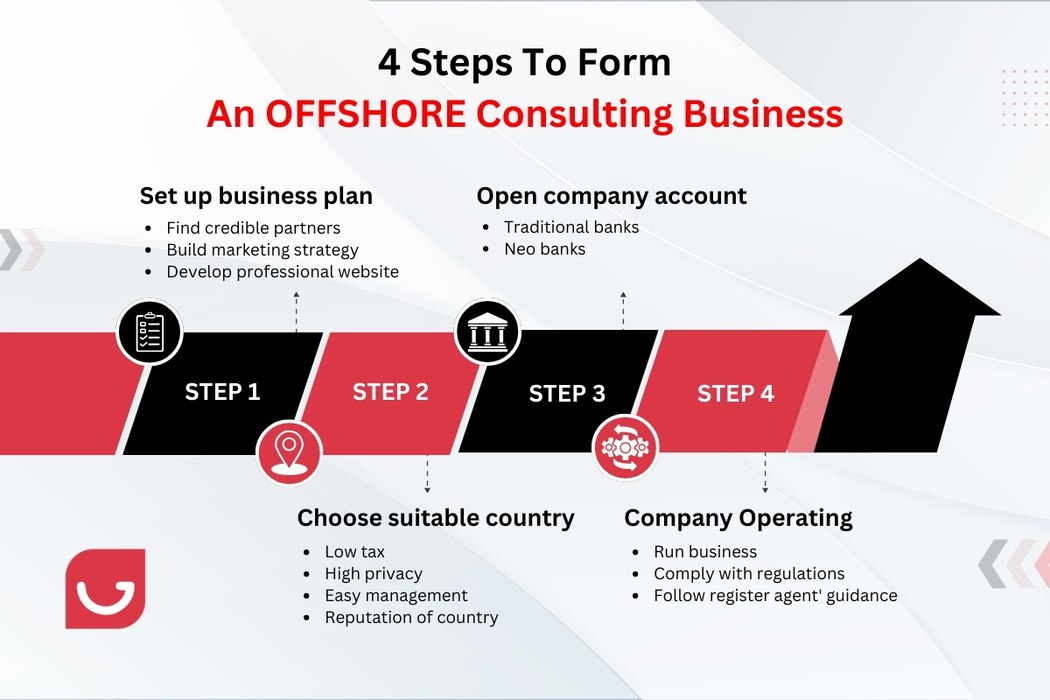How Offshore Company Formations Help Business Owners Optimize Worldwide Operations
Wiki Article
Debunking Offshore Business Formations: Exactly How They Run and What to Anticipate
Offshore business formations can appear complicated and enigmatic. Offshore Company Formations. These entities, typically developed for tax benefits and privacy, run under distinct legal frameworks. Business owners might find themselves navigating through a maze of policies and compliance demands. Understanding the ins and outs is vital for success. What are the genuine advantages? What are the potential mistakes? A closer examination exposes the nuances that could impact decision-making substantiallyComprehending Offshore Business: Interpretations and Kinds
Offshore companies are entities developed in a jurisdiction outside of a person's or service's main nation of residence, often for objectives associated with tax optimization, possession defense, or regulatory advantages. These companies can take various types, consisting of minimal responsibility firms (LLCs), international company companies (IBCs), and offshore trusts. Each kind offers certain functions and attract various requirements.Minimal responsibility companies offer owners with protection from personal liability, while international business firms are popular for their versatility and minimal coverage requirements. Offshore counts on, on the other hand, are made use of largely for estate planning and possession protection.
The selection of jurisdiction significantly influences the firm's procedures, as some areas offer a lot more beneficial legal frameworks and privacy securities. Offshore Company Formations. Recognizing the differences in between these kinds is essential for individuals and companies thinking about overseas frameworks, as each choice brings different effects for governance and conformity
The Benefits of Developing an Offshore Company
Establishing an offshore company can supply numerous advantages, particularly for those looking for to enhance their financial approaches and secure their properties. One considerable advantage is tax optimization; lots of territories provide positive tax rates or exceptions, enabling services to preserve more profits. In addition, overseas business can offer a layer of privacy, protecting the identifications of proprietors and shareholders from public scrutiny.An additional advantage is possession security. By putting possessions in an offshore entity, individuals can secure their riches from potential lawful claims or political instability in their home nations. This structure likewise helps with worldwide business procedures, allowing easier accessibility to varied customers and global markets.
The establishment of an offshore firm can boost trustworthiness and reputation, appealing to clients who value worldwide service techniques. Overall, these benefits make offshore company formations an eye-catching option for individuals and companies going for financial development and safety and security.
Secret Considerations Before Developing an Offshore Entity
Before developing an overseas entity, a number of critical aspects should be examined. Lawful compliance requirements, tax ramifications and benefits, in addition to jurisdiction choice, play a substantial duty in the decision-making process. Understanding these considerations can help organizations and people browse the complexities of offshore company formations properly.
Legal Compliance Demands
When thinking about the development of an overseas entity, recognizing legal compliance demands is important to ensure adherence to both global and regional laws. Possible entrepreneur should acquaint themselves with laws governing firm registration, reporting responsibilities, and functional requirements in the picked jurisdiction. This includes verifying the legal requirements for shareholders and directors, as well as ensuring compliance with anti-money laundering (AML) and know-your-customer (KYC) guidelines. Additionally, services need to stay familiar with any kind of licensing demands details to their industry. Engaging regional legal and economists can supply useful understandings, making certain that all required documents is prepared and submitted correctly. Ultimately, extensive understanding of legal compliance assists alleviate risks and cultivates a lasting offshore operation.Tax Obligation Effects and Advantages
Numerous company owners think about the tax obligation implications and benefits of creating an offshore entity as an essential consider their decision-making process. Offshore business can provide significant tax obligation advantages, such as reduced business tax obligation rates, exemption from certain regional tax obligations, and the capacity to delay taxes on foreign income. These advantages can bring about boosted profitability and money circulation, making overseas structures appealing for worldwide company operations. Additionally, the capacity for tax obligation treaties might even more lessen tax obligations. However, it is vital for company owner to comprehend the intricacies included, including compliance with both worldwide and local tax obligation guidelines. Involving with tax professionals is a good idea to navigate these details effectively and ensure perfect tax planning techniques.Jurisdiction Choice Aspects
What aspects should one consider when choosing a territory for overseas business development? Secret considerations include tax performance, governing atmosphere, and political security. Territories with beneficial tax obligation routines can greatly influence profitability. The regulatory landscape should supply versatility and simplicity of conformity, enabling reliable company procedures. Political security is vital, as it ensures the safety and security of properties and connection of operations. Furthermore, the reputation of the jurisdiction can influence customer depend on and organization connections. Ease of access to banking services and the schedule of specialist support services are also vital. Comprehending regional regulations concerning reporting, privacy, and possession requirements is vital to identify that the overseas entity lines up with the business owner's goals and lawful commitments. Possession The Process of Setting Up an Offshore Business Establishing an offshore business includes a series of critical steps that call for mindful preparation and compliance with global laws. Originally, an individual need to pick an appropriate jurisdiction that aligns with their service purposes and offers beneficial tax obligation benefits. Following jurisdiction selection, the following step is to select an one-of-a-kind business name and prepare the needed documentation, consisting of write-ups of consolidation and investor agreements.When the documentation prepares, it must be submitted to the relevant authorities in addition to the required fees. After approval, the business will obtain a certification of unification, officially developing its legal presence. The private need to then open up a corporate savings account to promote financial purchases.
Ultimately, preserving an offshore business entails adhering to recurring conformity requirements, such as yearly reporting and tax obligation commitments, which differ by territory. Understanding each step is crucial for a successful overseas company formation.

Regulative and lawful Structure for Offshore Firms
While establishing an overseas firm can offer considerable advantages, it is important to steer with the complex legal and governing framework that governs such entities. Each jurisdiction has its very own collection of laws that dictate everything from company development to tax and conformity demands. These regulations are created to stop unlawful activities, such as money laundering and tax obligation evasion, and typically call for thorough documentation and openness.Trick elements of this framework consist of the requirement of appointing neighborhood supervisors, keeping an authorized workplace, and sticking to annual coverage commitments. In addition, many jurisdictions impose specific licensing requirements for sure company activities. Recognizing these lawful terms is important for making certain compliance and mitigating dangers associated with fines or legal conflicts. Engaging with legal specialists that specialize in offshore firms can aid in steering with this elaborate landscape, ultimately promoting a certified and successful offshore organization procedure.
Typical Mistaken Beliefs Regarding Offshore Firms
Lots of people hold false impressions concerning overseas business, commonly relating them with tax obligation evasion and unlawful activities. Nevertheless, it is very important to acknowledge that these entities can run legally within a framework made for legitimate company methods. Clarifying the lawful standing of offshore companies can assist dispel these myths and promote a much more precise understanding of their objective.Tax Obligation Evasion Misconceptions
Regardless of the growing popularity of overseas firms, false impressions about their use for tax obligation evasion linger. Many people incorrectly believe that establishing an overseas entity is exclusively a means to prevent taxes. Offshore companies are frequently utilized for legitimate purposes, such as possession security, global company development, and investment diversification. The assumption that all offshore tasks equate to illegal tax obligation evasion forgets the intricacies of international tax obligation regulations and conformity needs. Furthermore, the huge bulk of overseas territories have actually executed measures to combat tax evasion, advertising openness and details exchange. This mischaracterization can discourage legit services and capitalists from discovering the potential benefits of offshore company formations while continuing an unfavorable stigma surrounding these entities.Lawful Standing Clarified
The lawful standing of overseas firms is typically misconstrued, causing a selection of misunderstandings. Many believe these entities run in a lawful grey area, assuming they are dishonest or naturally unlawful. In truth, offshore companies are reputable companies developed under the legislations of particular territories, designed for different factors, including property protection and market expansion. An additional typical misunderstanding is that offshore business escape tax obligations completely; nonetheless, they are subject to the policies and tax obligations of their home nations. Furthermore, some people assume that offshore business can try this be easily exploited for cash laundering or prohibited activities. While abuse can occur, many jurisdictions apply stringent compliance and transparency legislations to mitigate such threats, ensuring that offshore companies operate within legal structures.
Taking care of and Operating Your Offshore Business Properly
Effectively taking care of and running an offshore business calls for a calculated approach that balances conformity with neighborhood policies and the search of company goals. Effective overseas administration entails comprehending the jurisdiction's tax obligation legislations, reporting needs, and operational laws. Employing neighborhood professionals, such as accounting professionals and lawful experts, can supply indispensable insights right into passing through these intricacies.In addition, establishing clear communication channels and operational procedures is crucial for preserving effectiveness. Utilizing innovation for project management and Web Site collaboration can improve efficiency, while routine efficiency examines warranty positioning with strategic objectives.
Keeping durable monetary records is essential, as transparency fosters count on with stakeholders and complies with global standards. Lastly, being versatile to modifications in regulation or market conditions enables overseas companies to pivot successfully, assuring long-lasting sustainability and growth. By sticking to these concepts, entrepreneur can take full advantage of the advantages of their overseas ventures while mitigating dangers.
Often Asked Concerns
Just how much Does It Expense to Keep an Offshore Business Annually?
The expense to preserve an offshore business annually varies significantly, typically ranging from $1,000 to $5,000, relying on jurisdiction, services required, and conformity obligations. It is vital to consider added fees for certain needs.Can I Open a Checking Account for My Offshore Business Remotely?
Opening up a checking account for an overseas business remotely is typically possible. However, requirements may differ by territory, frequently demanding documentation and verification procedures, which can complicate the remote application experience for people.Exist Details Countries Recognized for Easier Offshore Firm Formations?
Specific nations, such as Belize, Seychelles, and the British Virgin Islands, are renowned for their desirable laws and streamlined processes regarding offshore company formations, bring in business owners seeking efficiency and confidentiality in company procedures.
What Kinds of Services Are Finest Fit for Offshore Business?
Particular businesses, such as investment, e-commerce, and consultancy companies, often gain from offshore business as a result of tax advantages, personal privacy, and regulative versatility - Offshore Company Formations. These entities generally flourish in territories that promote positive organization environmentsJust How Can I Make Sure Compliance With Regional Regulations When Operating Offshore?
To assure conformity with local laws when running offshore, it is important to engage lawful specialists, perform thorough research study on jurisdiction policies, and keep clear economic documents, thereby lessening threats connected with non-compliance.
Report this wiki page